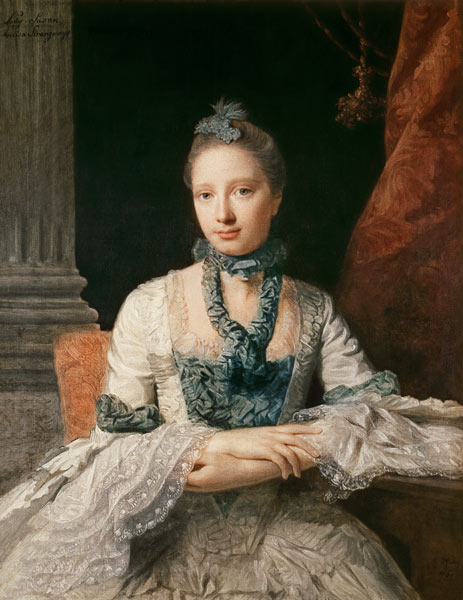 |
| Alan Ramsay, Lady Susan Fox-Strangeways, 1761
By Samuel Richardson, London, Penguin Books, 2004, p. 1533.
Clarissa Harlowe dies of a broken heart after being betrayed by her family and raped by Robert Lovelace, a late Restoration rake. I first encountered Richardson's book by watching "Masterpiece Theater" on PBS during the 1980s. (RIP Alistair Cooke) I learned a lot about 18th-19th century life from that TV series. I remember their depiction of a drugged Clarissa splayed on a bed as a triumphant Lovelace turns away. This tableau sums up Clarissa's destruction in my mind's eye.
The virtuous heroine is an heiress pressured by her family to marry a repugnant yet rich neighbor. The Harlowe's lock Clarissa in her bedroom until she agrees to this proposal. Clarissa is a dutiful daughter, but her best interests are sacrificed to familial hubris and ambition. Through reasoned argument and declarations of sincere good will, Lovelace lures Clarissa away from her family. When his sexual overtures are spurned, Lovelace takes by force what he could not obtain by persuasion. Clarissa exchanges the prison of her parent's home for the trap of a ruthless sadist. I've read and reread Clarissa so many times because it takes the reader inside the mental world of both Clarissa and Lovelace. Again, Smiley links this to the new habits of introspection encouraged by the Reformation. One looks inward to perceive signs of God's grace: correct thoughts and actions are rewarded by an easy conscience and economic prosperity. In the modern novel, actions and psychology work together to create a character's fate. Smiley writes, "It is not that character is destiny, but that choices are destiny....[Protagonists] reflect constantly upon the consequences of wrong and right choices, in this world and the hereafter. They do not consider Fate, for example, and so instead of illustrating, let's say, the working of a tragic flaw, they model how to get through the day or the week....This religion of the middle class, the self-made protagonist, stands in strong contrast to the pattern of aristocratic literature (notably the epic) that preceded it, in which the hero is the dupe of circumstances, and his only choice is the manner in which he meets his fate." Clarissa is an epistolary novel--the story is told through a series of letters--and this form, too, heightens the sense of psychological intimacy between protagonists and readers. Characters explicate actions and detail the thinking behind these choices. Its as if the protagonists are writing to the reader. For example, Lovelace pens a chilling letter to his best friend telling of Clarissa's rape, "And now, Bedford, I can go no further. The affair is over. Clarissa lives. And I am your humble servant, R., Lovelace." Reading these words, I felt both complicit in the crime and outraged for Clarissa's sake. There's no authorial voice to guide the reader's emotions. We live inside the intelligent, furious, and determined minds of Clarissa and Lovelace. |
A diary devoted to reading the 100 novels cited in Jane Smiley's 13 Ways of Looking at the Novel
Saturday, January 19, 2013
Clarissa, or, The History of a Young Lady
Subscribe to:
Post Comments (Atom)
No comments:
Post a Comment